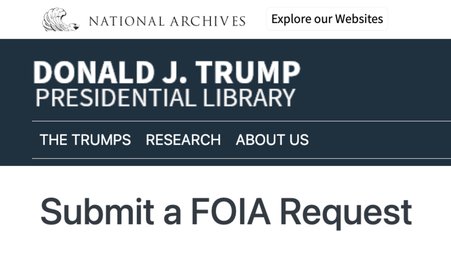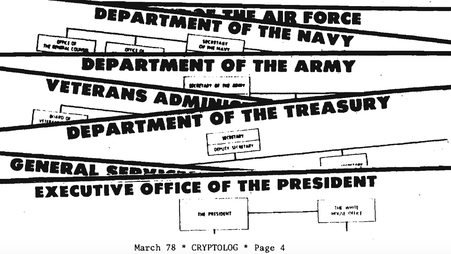
During President Trump’s shutdown of parts of the federal government over a border wall, transparency was declared a nonessential part of the government’s operations—with very real effects on the public’s right to know.
Last Thursday—the day before Congress signed a short-term bill ending the 35-day partial government shutdown—I spent several hours contacting numerous federal agencies’ public information and FOIA offices, in an attempt to understand which were accepting and processing requests, which were accepting new requests but not processing them, and those that were doing neither.
Considering the Department of the Interior had shut down its online FOIA request portal altogether due to the shutdown, it might seem like a reasonable assumption that no federal agencies would be processing FOIAs due to the lapse of funding. An Interior Department spokesperson noted that "FOIA requests are not directly related to protecting life and imminent threats to property."
But at least some federal FOIA requests were still slowly moving along—security researcher Trammell Hudson received an update on a request with the FBI on Jan. 9, in the midst of the shutdown. And the Justice Department's FOIA handbook clearly states that FOIA officers were still obligated to fill requests within the appropriate timeline—even in situations of government shutdowns—so I wanted to clarify.
The FBI apologizes for mistakenly informing me that they did not have responsive documents to my FOIA request and that they "are currently in the process of searching, gathering, and processing any newly discovered material so that it may be reviewed for responsiveness." pic.twitter.com/8N6EAXirfn
— Trammell Hudson ⚙ (@qrs) January 8, 2019
The FBI employee that answered my phone call told me that questions about FOIA processing would be a question for FBI headquarters. But upon calling FBI headquarters, there was no one to answer the phone. I called a dozen different CBP and ICE public affairs officers, and never once reached a human. Some voice mail boxes said that they were unable to return messages due to the furlough.
On Jan. 28, days after making the calls, a spokesperson for the Environmental Protection Agency finally sent me an email: “EPA will start processing FOIA requests now that the shutdown has ended.”
I was, for every agency I contacted, unable to confirm or deny whether it was processing FOIA requests at all. (I suppose I was GLOMAR’ed yet again.)
“There is no basis for government to blow its deadlines just because of shutdown,” said Adam Marshall, an attorney at the Reporters Committee for Freedom of the Press. “But as a practical matter, that’s exactly what we’re seeing. Even under the guidance of previous shutdowns, agencies have to count the days that they took to respond. And this is really damaging the public's right to access government records.”
According to transparency activist and technologist Freddy Martinez (who was previously a fellow at Freedom of the Press Foundation), it’s important that government agencies count the number of days that a FOIA request goes untouched. If an agency does not respond at all to a request within 20 days, the requester has the right to sue.
“Making an exception to the deadlines the government has in place, for a government shutdown, would weaken FOIA and interfere with people’s right to sue. The government has seen those deadlines as necessary, considering they are the law,” he said.
Litigation over FOIA requests is not only more common than ever, but some also argue that lawsuits are increasingly necessary to obtain government records in the face of pervasive bureaucratic resistance.
Adam Marshall noted that during the shutdown, all of his federal FOIA litigation literally ground to a halt. “It’s disturbing because by the time a requester is at the point of litigation, people have invested time and money into an attorney and lawsuit.”
Another prominent FOIA attorney corroborated that his federal cases were also delayed. “I can tell you all of my FOIA litigation is on hold,” said the Electronic Frontier Foundation’s David Sobel. “The Justice Department has moved for stays in all of my pending cases and my understanding from other attorneys is that that’s pretty much across the board—because the assistant US attorneys who represent in these cases are furloughed.”
Kevin Goldberg—a First Amendment and FOIA attorney—said he would imagine that under any administration, FOIA would be declared a nonessential function of the federal government.
“I don’t think that’s a change, and I’m not sure it’s sort of specific action on [Trump’s] part to shut things down,” he said.
This most recent partial shutdown was certainly not the first of its kind, and in previous shutdowns, such as one in October 2013 during the Obama administration, FOIA operations similarly shutodwn. But this most recent instance—which stretched from December into late January—was the longest in history. Whether the effects of the shutdown on FOIA were intentional or not, they were very real.
“If government shutdowns become more frequent, and particularly if they become longer and longer, I could see them start to affect the process and usefulness of filing FOIA requests—including the litigation process—in really troubling way,” said Martinez.
Michael Morisy, cofounder of MuckRock, noted that FOIA offices were already stretched to the breaking point before Trump’s hiring freeze and certainly before the partial shutdown. “Telling FOIA officers that they’re without pay, when they weren’t paid well in the first place?”




